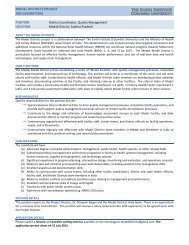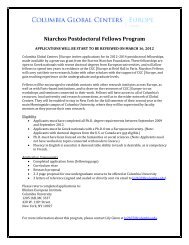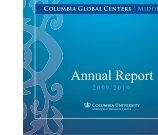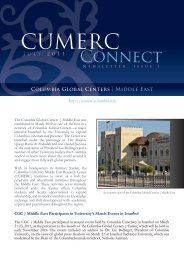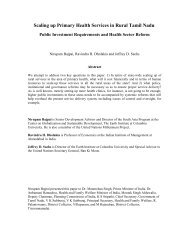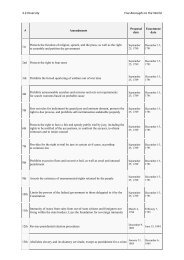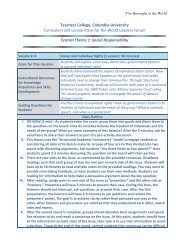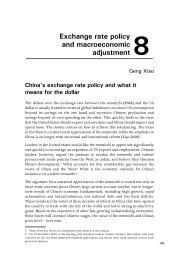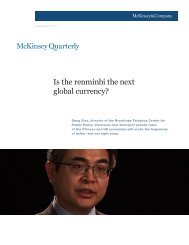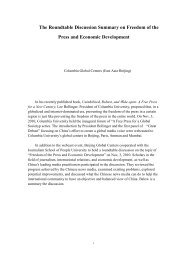Annual Report 2010 | 2011 - Columbia Global Centers
Annual Report 2010 | 2011 - Columbia Global Centers
Annual Report 2010 | 2011 - Columbia Global Centers
You also want an ePaper? Increase the reach of your titles
YUMPU automatically turns print PDFs into web optimized ePapers that Google loves.
<strong>Columbia</strong> <strong>Global</strong> <strong>Centers</strong> | Middle East<br />
The <strong>Columbia</strong> <strong>Global</strong> <strong>Centers</strong> | Middle East was established in March 2009 as one of the first in the network of<br />
<strong>Columbia</strong> <strong>Global</strong> <strong>Centers</strong>. The Center was launched under the patronage of Her Majesty Queen Rania Al Abdullah<br />
and was created because of the realization of President Lee Bollinger and a number of other University leaders that<br />
<strong>Columbia</strong> needed to learn more about the world around it and engage more fully with global partners. With its<br />
headquarters in Amman, Jordan, the <strong>Columbia</strong> University Middle East Research Center (CUMERC) serves as a<br />
hub for programs and educational initiatives throughout the Middle East. These activities serve mutually beneficial<br />
ends: the Center offers <strong>Columbia</strong> students and faculty opportunities to expand scholarship, and its work contributes<br />
to knowledge exchange and skill development with academics, experts and practitioners throughout the region.<br />
Location: Middle East<br />
From the outset, there was little question that the Middle East was ripe with opportunities—and needs—for<br />
implementing <strong>Columbia</strong>’s global strategy. From renewable energy to nuclear proliferation, some of the most<br />
important global issues are rooted in the region. Establishing a foundation in the region is essential in terms of<br />
understanding recent geopolitical trends, improving East-West understandings, and promoting religious and cultural<br />
tolerance. Likewise, investment and innovation in education are critical to the future development of the Middle<br />
East. By the year 2050, 44 million people in the region will need jobs. Some estimates have indicated that providing<br />
economic opportunities to satisfy the youth population in the Middle East and North Africa (MENA) region will<br />
require creating 100 million new jobs in the coming years. One of the greatest challenges facing the Middle East<br />
involves creating social and educational infrastructures that can handle its young population. In Jordan, 37% of<br />
the population is under the age of 15; in Iraq, that number is 43%, and in Yemen, it is 45% as compared to 13%<br />
in the United States. 2 And though the region once boasted the world’s first libraries and impressive educational<br />
traditions in engineering, medicine, and literature, the legacy of scholarship in the Middle East has suffered from<br />
neglect and insufficient funding for centuries.<br />
A number of choices exist in terms of locating a <strong>Global</strong> Center in the MENA region—from Marrakech to Muscat.<br />
There are many reasons for the selection of Amman, Jordan as the location of the <strong>Columbia</strong> <strong>Global</strong> <strong>Centers</strong> | Middle<br />
East: Jordan is an incredible model of development and reform, the nation welcomed <strong>Columbia</strong> so graciously, the<br />
opportunities for research and engagement are vast, and the country provides easy and welcome access to the rest of<br />
the Middle East. But the truest rationale is Her Majesty Queen Rania Al Abdullah. Her Majesty has been a tireless<br />
champion of education and progressive reform for the nation, and for the region as a whole. Under the leadership<br />
of His Majesty King Abdullah II and Her Majesty Queen Rania, Jordan has become a model for reform in areas<br />
such as ensuring the welfare of families, women, and children; advancing education; and initiating processes of<br />
rigorous, systemic reform.<br />
In the assessment of <strong>Columbia</strong>’s leadership, the positioning in Amman offered both the flexibility and proximity to<br />
develop relationships across the region, from the Levant to North Africa to the Gulf. Its headquarters in Jordan affords<br />
the Center a wide network of contacts and opportunities for expanding operations and forging new partnerships,<br />
and the regional experience and connections of the Center’s Director, Professor Safwan Masri, offer an additional<br />
base of strength and support.<br />
2 http://www.globalhealthfacts.org/data/topic/map.aspx?ind=82<br />
19



